For over 60 years, brilliant researchers have been unraveling the secrets of the science of persuasion. They’ve been unlocking the mystery behind what factors influence us to say “yes.”
Today, we’re diving deep into this research with our summary of Robert Cialdini’s game-changing book, “Influence.” If you’re in marketing, entrepreneurship, sales, or even if you just love negotiation and the psychology of human behavior, then you’ve probably heard about this classic book before.
It’s an absolute treasure chest of practical insights, real-world examples, and simple hacks that can help us wield greater power in just about every area of life.
But here’s a problem: some say this book is “dangerous knowledge” because it shows how we can be manipulated in unethical ways. Scary, right? But I think it’s better for us to become aware of these “weapons of influence” so we can avoid falling into the traps set by bad people out there.
Who is Robert Cialdini?
Dr. Robert Cialdini, PhD, is one of the world’s top experts on the psychology of influence. He was Professor of Psychology and Marketing at Arizona State University. He’s often a consultant to political organizations and presidential campaigns, including Obama’s in 2008. His books have sold over 7 million copies in 44 languages.
Cialdini’s writing relies on his 35 years of experience studying the science of influence. For this book, he also conducted what you may call investigative research—going undercover for 3 years to find out what principles of persuasion are actually used in the real world by sales organizations, advertisers, and fund-raisers.
🧠 1. Automatic Triggers: We use “mental shortcuts” to make decisions, but they can mislead us
In this book “Influence,” Cialdini unveils six powerful principles of persuasion. These principles are rooted in the concept that both humans and animals rely on mental shortcuts for more efficient decision-making.

Take, for example, the mother turkey. Scientists discovered the nurturing behavior of a mother turkey is triggered almost entirely by a single cue: the “cheep cheep” sound of her baby turkeys.
In fact, researchers put a speaker inside of a stuffed cat that played the same “cheep cheep” sound, and discovered the turkey would act nurturing to the cat too! That’s how powerful this instinct is. Typically, turkeys and cats are natural enemies, but this sound triggers an automatic behavior in the turkey that requires no thought.
This illustrates the simple fact that we humans also have automatic, sometimes irrational triggers. These mental shortcuts typically guide us to making better decisions, but they can also be exploited, leading us to act against our own best interests. In the future, as our world tilts even more towards fast-paced information overload, we’re likely to rely more and more on these shortcuts.
Here are 3 quick, fascinating examples:
- The Power of “Because.” Just adding the single word “because” when you ask for something can make you far more persuasive. Ellen Langer did a study to prove this. She found that when people asked to cut in line for a copy machine, they were far more successful when they added a reason like “because I need to make copies.” The rate of people saying “yes” jumped from 60% to 93%!
This shows that if you ask for a favour and add the word “because” with any reason (even an empty reason!), people are far more likely to say “yes.”
- The Contrast Principle. Our perception of something is often strongly influenced by what came immediately before it. For instance, if a salesperson makes you try on a high-priced item before a lower-priced one, the latter will seem even more affordable in contrast. It’s not just about the absolute value, but the relative perception. (You can read more about this concept of “The Relativity Illusion” in our summary of Predictably Irrational.)
- The Belief Expensive = Quality. A higher price tag can make us believe an item is of higher quality, even when there’s no actual difference. This is evident in experiments where the same wine, presented with different price tags, is rated completely differently in terms of taste and quality.
In Professor Cialdini’s newest book, called “Pre-Suasion,” he explains that before we can influence someone, we must first hook their attention. The most powerful triggers to get attention relate to sex, danger, or novelty. This is why advertisements often feature people who inspire feelings of visual attraction or even lust. And it’s why bad news gets the most clicks, including stories of violence, wars, and natural disasters.
Cialdini wrote in Pre-Suasion, “Certain cues seize our attention vigorously. Those that do so most powerfully are linked to our survival. Sexual and violent stimuli are prime examples because of our fundamental motivations to reproduce on the one hand and to avoid harm on the other—life and death, literally.”
We use mental shortcuts to make decisions quickly, but these can mislead us. Just like a mother turkey will nurture a stuffed cat that makes a “cheep cheep” sound, we also respond to triggers in automatic, irrational ways.
🎁 2. Reciprocity: We feel obligated to pay back gifts and favours we have received
Let’s dive into the first of Cialdini’s six principles of influence: Reciprocity. Reciprocity is all about our instinct to repay others what they have given us.

Ever felt like you should buy lunch for someone who treated you last time? That’s reciprocity in action! In one study at Cornell, people were given a free Coke and then asked to buy some raffle tickets. Those who had received the Coke bought twice as many raffle tickets as those who did not.
In most human cultures, reciprocity is an unspoken rule. People who take without giving tend to be judged and shunned. On the one hand, this is a social norm that encourages sharing and cooperation. Most of us enjoy being able to exchange holiday cards, Christmas presents, and party invitations with friends and family.
But there’s a catch, because in some situations reciprocity can work against us…
We should beware “free” gifts that come with hidden strings attached, because they create a feeling of obligation within us.
For instance, in a romantic context, receiving free drinks or dinner from someone may pressure us into going out with them again, even if we’re not that interested.
Here are some real-life examples of the reciprocity rule in action:
- Free samples. Ever wondered why stores like Costco give out free samples? It’s not them being generous. Receiving a sample taps into our sense of obligation to buy something in return. The multi-level marketing company Amway began providing a “free” sample kit of their products to homes for 2-3 days. When Amway distributors came to collect the kit along with product orders, they reported an “unbelievable increase” in sales.
- Small gifts. A small item (like free labels) are often included in donation requests from charities. This strategy doubled the response rate for The Disabled American Veterans Organization. The religious group called the Hare Krishna Society also found giving a free flower or booklet to people on the street, before asking for a contribution, greatly increased donations.
- Reciprocal concessions. In negotiations, it can be super effective to make a big unrealistic request first, then retreat to a smaller one (what you really wanted in the first place). When you appear to be making a concession by reducing your demands, the other side often feels obligated to do the same. Cialdini calls this the “request, then retreat” strategy.
Speaking of negotiation, the best modern book on the topic is probably Never Split the Difference by Chris Voss, who was one of the FBI’s lead negotiators for decades. He says effective negotiation starts with listening intensely to the other side, so we make them feel understood and accepted. Listening to them engages a type of reciprocity, because when they feel understood they will usually respond by opening up to hear what we have to say.
This concept is also echoed by the classic self-help book How to Win Friends and Influence People by Dale Carnegie. It says, “You can make more friends in two months by becoming interested in other people than you can in two years by trying to get other people interested in you.” Again, part of the reason for that is reciprocity, as the other person will appreciate your genuine interest and respond in kind.
Learn more in our summary of How to Win Friends and Influence People
Reciprocity is our natural urge to return gifts and favours, and it’s a powerful tool in influence. Examples include: free samples, small gifts, and concessions in negotiations. Beware free gifts—they may just be a setup for a bigger request!
🤝 3. Commitment and Consistency: We want to appear consistent with our past actions
Alright, let’s jump into Cialdini’s second principle of influence: Commitment and Consistency. It’s all about our desire to stay true to our past actions and words.

Here’s a wild example from a study in the 1960s by the psychologists Freedman and Frasier. People were 400% more likely to agree to put a big ‘Drive Safely’ sign on their lawn… IF they had previously agreed to a much smaller request two weeks before – putting a tiny sticker in their window with the same ‘Drive Safely’ message.
Generally, being consistent is a positive trait – it builds trust. When someone is consistent, we can rely on them. But this law of human nature has a major downside, too. It can trap is into ‘foolish consistency.’
If someone can get us to make a small initial commitment, that can quickly escalate into a much larger one, before we realize what is happening.
For example, online business experts like Russell Brunson talk about making customers climb a “Value Ladder” – that means starting with very cheap offers, then consistently offering more expensive products or services over time. It’s much easier to turn a small sale or commitment into a large one, than to start with trying to make the larger sale.
Let’s see how the principle of Commitment and Consistency works in the real world:
- Door-to-door sales. Companies with in-person salespeople reduced returns dramatically simply by having the customer fill out the order form at the end of the sale, instead of the salesperson. Writing down the order with their own hand is a way the customer actively commits to the sale, preventing future buyer’s remorse. (Cialdini says written commitments are much stronger.)
- Wartime interrogation. During the Korean War, Chinese communist interrogators were able to influence American prisoners of war. They began with asking the U.S. soldiers to write down something small and reasonable like “The United States is not perfect.” But that led to greater concessions over time. Soon, the soldiers were writing essays about how America could be improved and reading them in front of a camera, making it look as if they had turned on their country.
- College fraternities. Why did so many frats have bizarre and embarrassing initiation rituals? They actually have a purpose, making members value their membership more. People value more what they struggle to attain, even if it’s not that good. This was backed up by the researchers Aronson and Mills.
The 48 Laws of Power by Robert Greene speaks to a related strategy. In that book, Law 20 says “Do Not Commit to Anyone,” suggesting that people who gain and keep power keep their options open as long as possible. It says, “It is the fool who always rushes to take sides. Do not commit to any side or cause but yourself.”
Queen Elizabeth I of England was a master at this, avoiding both political and marital commitments. By not committing to any one side or suitor, she kept potential allies hopeful and enemies uncertain, while maintaining her power and independence.
When we make a commitment, especially one that is public and in writing, then we feel the need to stay consistent with it. It’s a powerful tool in influence. But remember the next time you make a small commitment, it might just be the first step to a bigger one!
👥 4. Social Proof: We copy the actions of other people
Up next is Cialdini’s third principle of Social Proof, which says we tend to follow what others are doing. If we see a lot of other people doing a behavior, we assume it is correct for us to do it, too. In most situations, this is a shortcut for decision-making that makes our lives much easier. But, like the other principles, it can be taken advantage of. Let’s dive deeper into this…

To illustrate social proof, let’s look at some examples:
- The best-seller effect. Imagine you’re shopping on Amazon, looking at two similar products: one with 5 good reviews and the other with 5,000 good reviews. Of course, we will almost always choose the one with tons of reviews. And most often, it’s the best choice. However, we should beware: this instinct can be misled by a growing market of fake reviews, which companies are trying to combat. For this same reason, it seems like almost every book has “New York Times Best Seller” written on the cover. There’s surely no way that ranking can be gamed, right?
- The bystander effect—ever heard of it? It’s another way social proof can backfire. The bystander effect is when many witnesses see an emergency situation, but do nothing because they all expect someone else to act. In one dramatic example, during a stabbing witnessed by 38 people from nearby apartments, no one called the police. To counter this, Cialdini advises directly asking one specific person for help in crowded situations, like saying, “You in the red jacket, call an ambulance.”
- Laugh tracks. Many highly popular TV series use fake laughter. If you ask people whether they like these laugh tracks, most will tell you they don’t. So why do TV producers continue to use them? Because studies show laugh tracks consistently make people rate shows as being funnier. It’s an instinct underneath our conscious control—we hear laughter so we feel the jokes are funnier, too.
Today we often hear about “influencer marketing,” that is when a person with a large social media audience is paid to feature a certain product, like a water bottle or workout pants. This is a form of social proof. But it’s not a new strategy at all. Decades ago, Nike became the largest sports clothing company in the world by associating their brand with admired heroes like Michael Jordan and Tiger Woods.
And even 100 years ago, the same influencer strategy was being described in the book Propaganda by Edward Bernays. (Bernays is known as “the father of public relations” and he was also Sigmund Freud’s nephew.) He wrote, “If you can influence the leaders, either with or without their conscious cooperation, you automatically influence the group which they sway.”
In summary, Social Proof is our tendency of copying what others do, assuming a behavior is correct if many others are doing it. This explains why products that appear popular sell better—through more reviews, best-seller badges, or celebrity endorsements.
❤️ 5. Liking: We prefer to say yes to people we like
The fourth principle is Liking. When we feel good about someone, then we’re more likely to say yes to them, buy their product, or otherwise comply with their requests.

Let’s explore some key factors that drive likability:
- Similarity. We like people who seem to be like us. This is why salespeople are often trained to find something they have in common with their prospect, such as a favourite sport like golf or hobby like gardening. In a study involving MBA students, when told to find a commonality during negotiations, 90% were able to reach an agreement, up from 55%.
- Familiarity. We trust people more after seeing them multiple times. Joe Girard, celebrated as one of the world’s greatest car salesmen, said the secret to his success was sending out 13,000 greeting cards each month to his former customers. This personal touch kept him connected with a large clientele, so when they needed a new car they would go to Joe.
- Physical attractiveness. A positive trait like beauty or handsomeness can cast a halo over our entire perception of that person—a phenomenon researchers have appropriately called The Halo Effect. Studies have shown that physical attractiveness makes us assume someone is more intelligent.
- Compliments. We are “suckers” for praise and flattery, says Cialdini, even when the person giving us a compliment has a clear selfish motive. In the popular self-help book How to Win Friends and Influence People, offering genuine praise and sincere compliments is a top strategy for making people like you. We like people who say they like us.
Now let’s talk about some real-world examples of likability in business:
- Network marketing. In these organizations, sales happen mainly because of existing relationships between seller and buyers. For instance, people are twice as likely to buy Tupperware from a friend because they want to support their friend, not because they really want the product itself—this was found in a study by researchers Frenzer and Davis.
- Customer referrals. They are a way for a business to piggyback on existing trust between two people. A salesperson asks a customer if they know anyone else who might like their product. Then, when they contact these new people, they mention the friend’s name first.
- Digital marketing. In any type of content creation or social media, the experts (like Gary Vaynerchuk) always say that “consistency is king.” Why? Because showing up every week builds familiarity and trust, whether that is sending weekly email newsletters or daily social media posts.
Principle four is Liking. We are more likely to say yes to people we like. Factors that increase liking include similarity, familiarity, attractiveness, and receiving compliments. Many sales strategies are based on building trust and familiarity with a prospect over time.
🏛️ 6. Authority: We follow people that appear to be recognized authorities
The fifth principle is Authority. We obey directions from people who appear to be recognized experts, leaders, or officials. This is about the power of the titles, symbols and uniforms, like the white coat or business suit.

The conditioning to follow authority begins very early in childhood. You must obey your parents, because they understand the world better than you do at 3 years old. As we grow older, we meet other authority figures like teachers, police, and bosses. As with the other principles, this usually serves us well. Medical doctors earn their position through a dozen years of education.
However, this shortcut can make us vulnerable to unquestioning obedience, even to false authority. One shocking example is The Milgram Study, where participants continued giving electric shocks to another person, even when that person was crying and screaming in pain, because they were directed to do so by a figure in a lab coat. It’s a dramatic showcase of the frightening levels of obedience to authority we can show.
(For another dramatic illustration of this, you can read Man’s Search For Meaning by Viktor Frankl, a Jewish psychologist that survived the Nazi German concentration camps of World War II.)
Some common triggers for Authority include:
- Uniforms. The clothes a person wears can carry a lot of power an influence. Some examples include: the white doctor’s coat, the blue police uniform, and the green army outfit. In one social experiment in Texas, they found that if a man wears a business suit, people are 3 times more likely to follow him in crossing the street illegally. So a common tactic of con artists is to put on these universally recognized uniforms.
- Titles. Certain titles are legally protected, but other official-sounding titles may be totally unregulated or fabricated. For instance, what is the difference between a Certified Nutritionist and a Certified Nutrition Consultant? One of them had to complete the right degree, while the other didn’t need to complete any standardized program or training.
- Specialization. We assign more power to the specialist. For instance, if you run a small business would you rather hire an “Accountant” or a “Small Business Accountant.” In one experiment, real estate agents signed 15% more contracts when the receptionist introduced them from mentioning their specific expertise, like “Joe has 15 years of experience in this type of real estate.”
If you want to learn how to successfully market your new business or product, then here’s some related great advice. In the classic book The 22 Immutable Laws of Marketing, the renowned consultants Al Ries and Jack Trout write, “The essence of marketing is narrowing the focus. You become stronger when you reduce the scope of your operations. You can’t stand for something if you chase after everything.”
Cialdini’s fifth principle, Authority, reveals our tendency to follow perceived authorities. We are strongly influenced by triggers like a person’s clothes, titles, and specialization.
⌛ 7. Scarcity: We want things more when they’re harder to get
The sixth principle, scarcity, means whenever something seems less available, we tend to value and desire it more. It’s why those ‘limited edition’ sneakers or that item with ‘only 2 left in stock’ on Amazon seem so much more appealing. When it comes to sales, scarcity is making the customer aware of what they may lose if they don’t take action. Some people sum it up as “fear of loss.”
In his book Thinking, Fast and Slow, the Nobel laureate Daniel Kahneman wrote about a core psychological principle called “Loss Aversion.” He found that in real-life human decision-making, fear of loss is 2.5 times more powerful of a motivator than desire for gain.

Common scarcity strategies you’ve probably seen include:
- Limited quantity. Only selling a limited number of the thing—whether that is a product, service, event ticket, etc. In one experiment by Stephen Worschel, people rated chocolate chip cookies as being tastier when they came from a jar with only 2 cookies, rather than 10, thereby seeming more limited.
- Limited time. Only selling up to a specific deadline. Most retailers use sales promotions to lure people back into their stores, on dates like Black Friday or Cyber Monday. Another variation of this is knowing the price will be going up in the future.
- Auctions. When many buyers compete for one product, scarcity is maximized. This is why people can become irrational in the heat of an auction, spending more money than they planned.
Alex Hormozi, author of $100M Offers, shares many practical strategies about how we can apply scarcity to our own marketing and sales:
- First, when it comes to limiting the quantity of what we sell, he says honesty is the best form of scarcity. For example, if you run a marketing agency, then you have a natural limit for how many clients you can serve. So just let your prospects know about it! “We only have 5 spots available this month for new clients.”
- Second, when creating limited time promotions, you can create rolling seasonal offers. Any reason for a deadline will do, says Hormozi. A New Year’s offer in January, a Valentine’s Day offer in February, a St. Patrick’s Day offer in March, and so on.
Scarcity triggers a basic fear and desire in us: when something is rare, we often want it more. Marketers and salespeople use this by limiting how much or how long we can buy something, making us worry about missing out.
- Utilize Reciprocity: In business, consider giving small gifts or bonuses to customers. In personal life, remember that small favors can build goodwill.
- Apply Commitment and Consistency: Make your goals public, such as in team meetings or on social platforms. This public declaration holds you accountable.
- Leverage Social Proof: Use testimonials or showcase popularity in marketing strategies. In personal decisions, look to trusted groups for guidance but maintain critical thinking.
- Increase Likability: Build rapport by finding common ground and showing genuine interest in others. This can improve both sales and interpersonal relationships.
- Establish Authority: Share expertise and credentials where relevant. Dressing professionally and using confident language can also boost perceived authority.
- Create Scarcity: In marketing, highlight limited-time offers or exclusive products. In career negotiations, emphasize unique skills or limited availability—such as receiving a job offer from another employer.


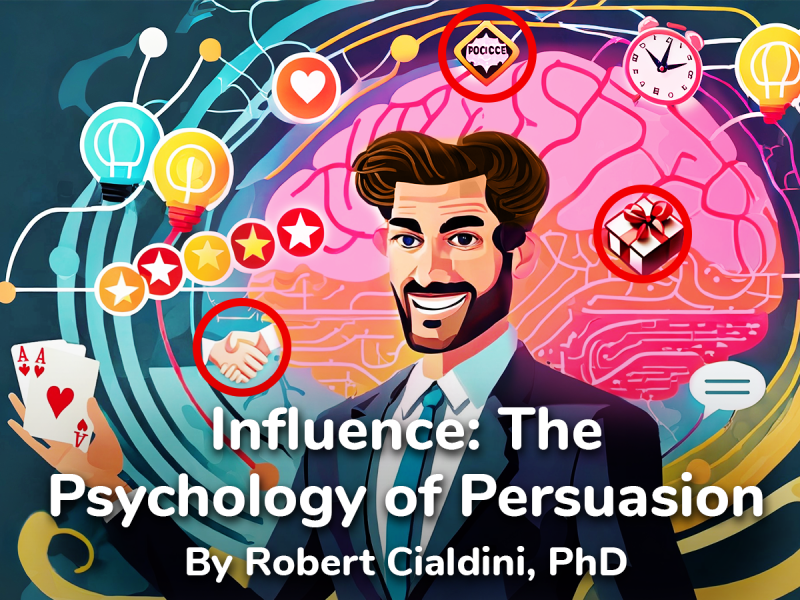
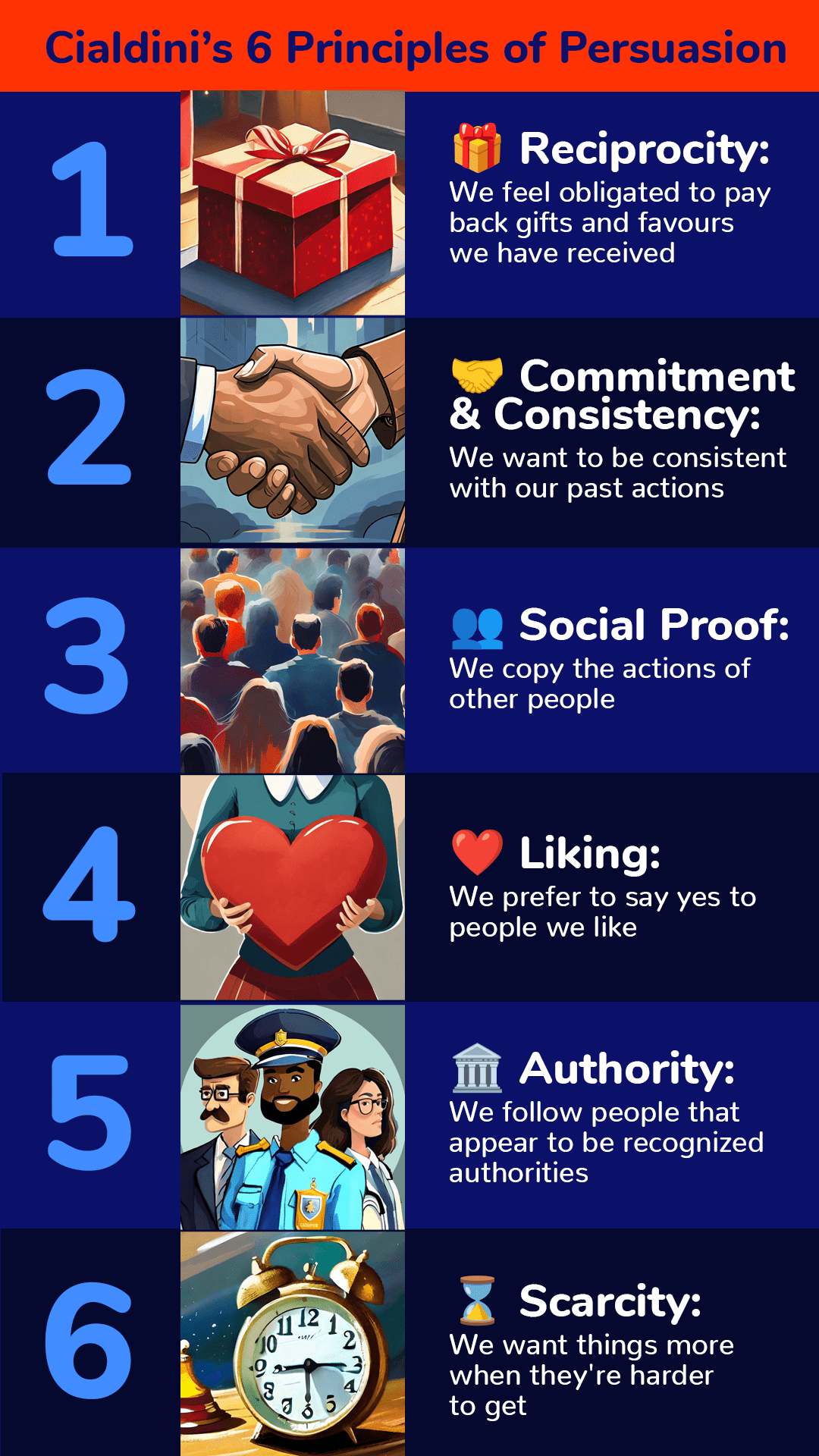
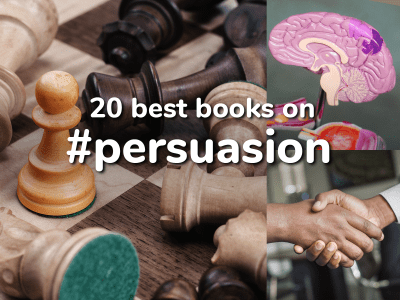


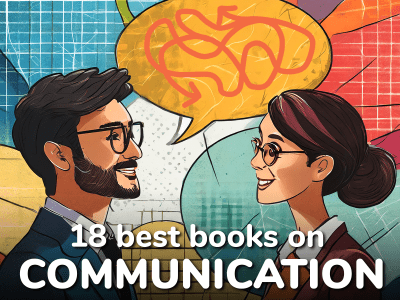


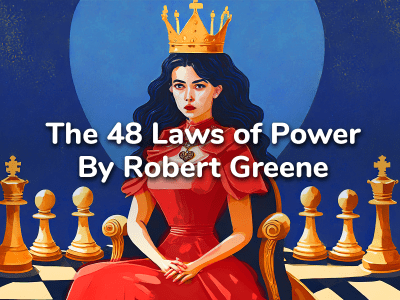
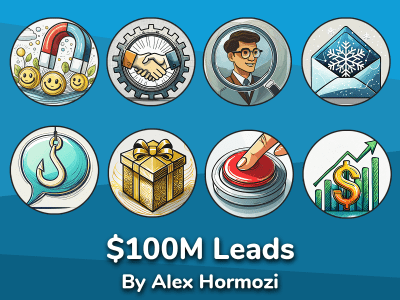
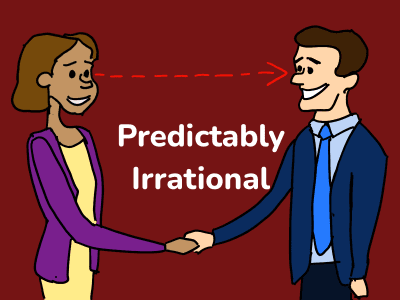




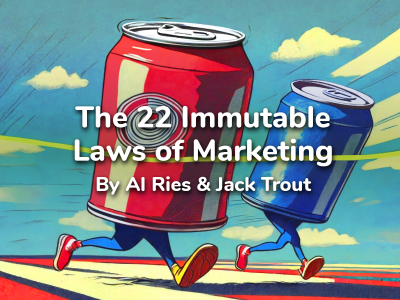
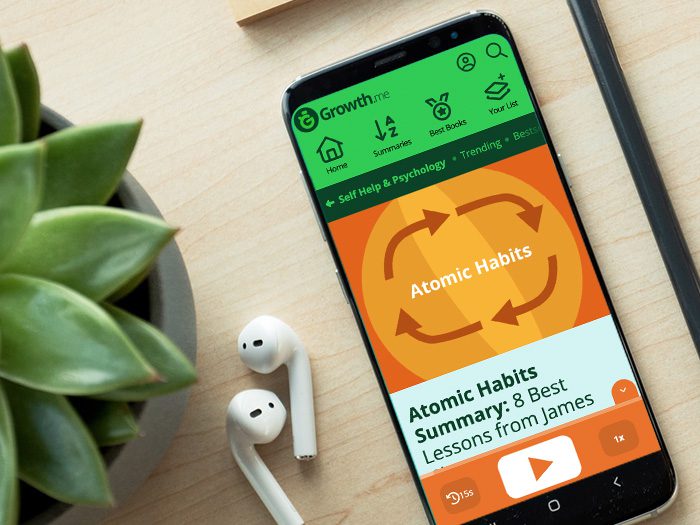
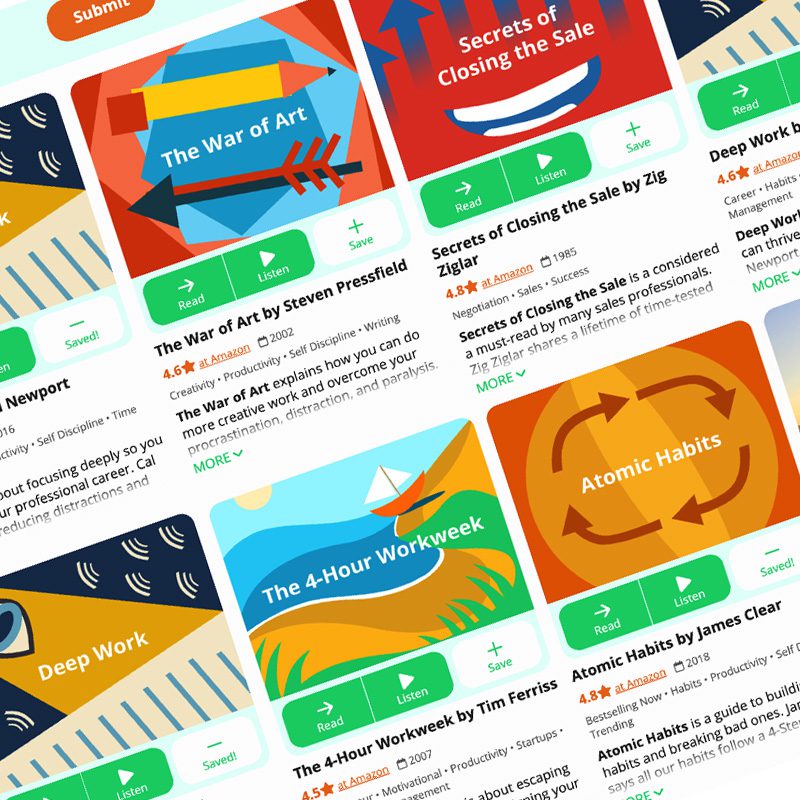
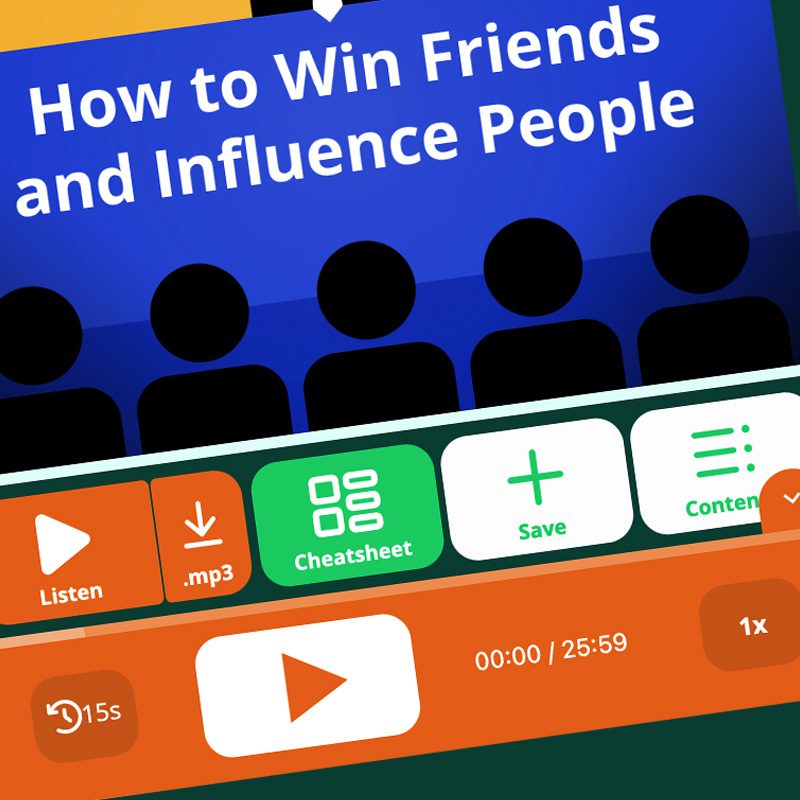
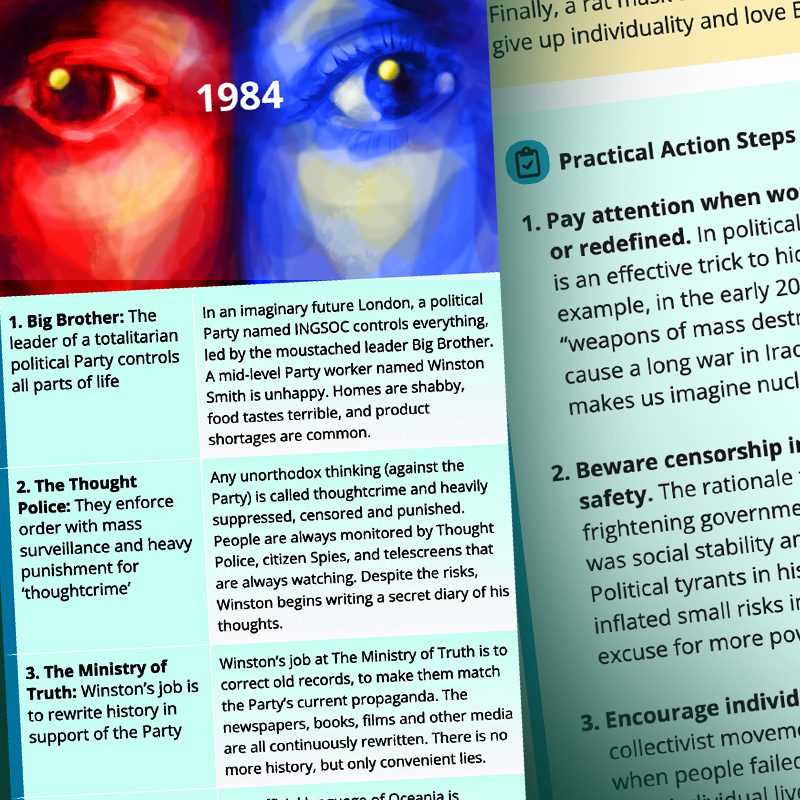


Community Notes